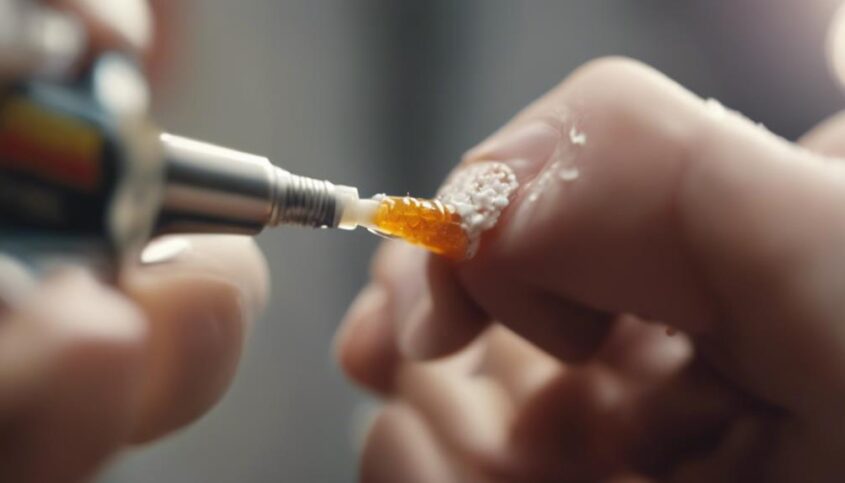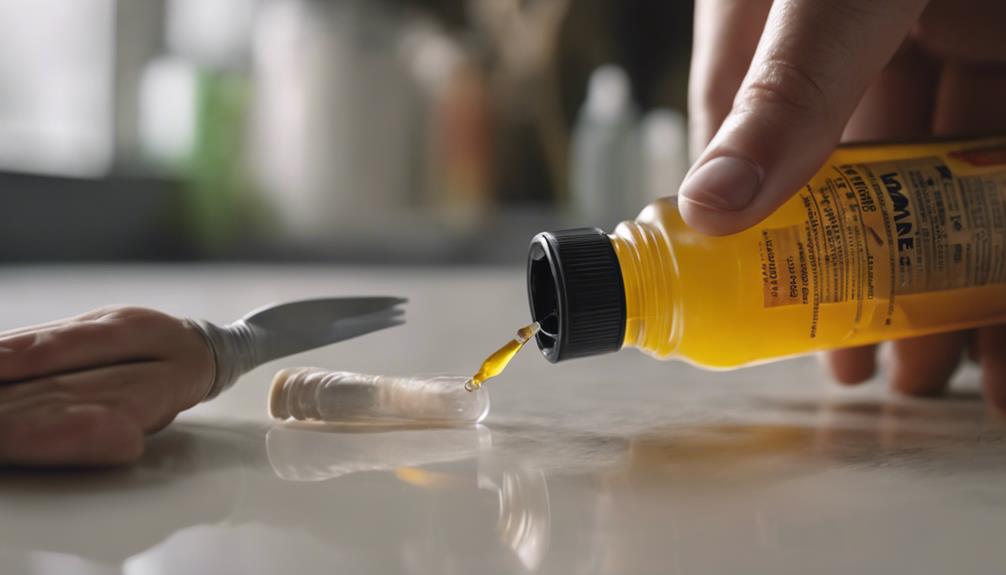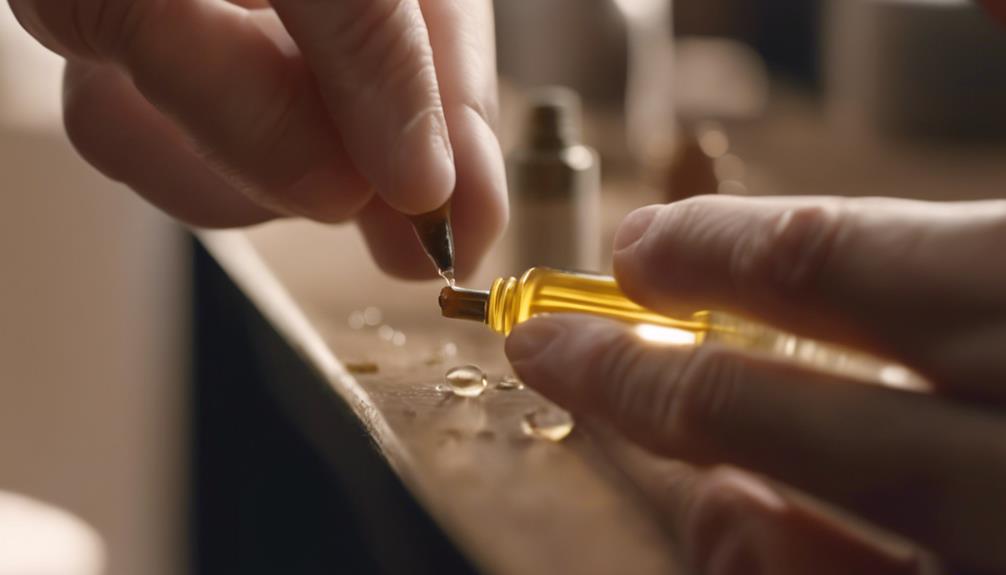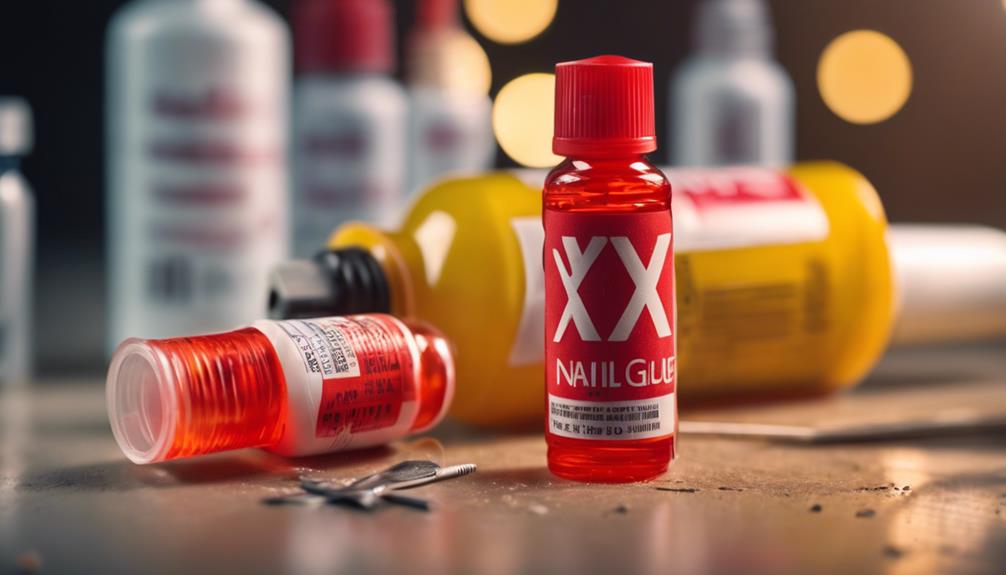Can I Use Super Glue Instead of Nail Glue?

While super glue may seem like a quick fix, it is not recommended to substitute it for nail glue due to potential risks and differences in formulation. Nail glue is specifically designed for cosmetic applications and provides a strong bond suitable for artificial nails. Super glue, on the other hand, can contain toxic ingredients that may harm the nails and skin. To explore safer alternatives and learn more about the risks and safe application of super glue, consider the detailed information provided to make an informed decision for your nail care needs.
Key Takeaways
- Super glue is not ideal for nails; it contains toxic ingredients that can harm the skin and weaken nails.
- Nail glue is specifically designed for nails, providing a strong bond without the risks associated with super glue.
- Using super glue on nails can lead to skin irritation, burns, and damage to the nail bed.
- Safe alternatives like specialized nail adhesives or gel nail adhesive offer better bonding without the risks.
- It is recommended to avoid using super glue on nails and opt for nail-specific adhesives for safe and effective application.
Super Glue Vs. Nail Glue: Differences

When considering the choice between using super glue or nail glue for adhering artificial nails, it is essential to understand the key differences between the two adhesive options. While both serve the purpose of attaching artificial nails, they are formulated for distinct applications. Nail glue, specifically designed for cosmetic use, provides a strong bond suitable for attaching artificial nails with precision. Its quick-drying formula and easy application make it a popular choice among nail technicians and enthusiasts.
On the other hand, super glue, although effective in bonding various materials, including plastics and metals, is not formulated for cosmetic purposes. Super glue tends to have a stronger bond than nail glue, which can be advantageous in certain situations but may also pose risks when used on delicate areas like nails. The chemical composition of super glue differs from that of nail glue, potentially leading to adverse reactions when in contact with the skin or natural nail.
Risks of Using Super Glue on Nails
Utilizing super glue on nails poses potential risks due to its formulation not being intended for cosmetic applications. While it may seem like a quick fix, there are several dangers associated with using super glue on nails:
- Toxic Ingredients: Super glue contains chemicals like cyanoacrylate, which can be harmful when in contact with skin or nails.
- Skin Irritation: Applying super glue on nails can lead to skin irritation, redness, and even burns due to its strong adhesive properties.
- Nail Damage: The strong bonding nature of super glue can cause damage to the nail bed, leading to brittleness, peeling, and weakening of the nails.
Considering these risks, it is crucial to explore safer alternatives specifically designed for nail applications to ensure the health and integrity of your nails.
How to Safely Apply Super Glue

To ensure safe application of super glue, it is imperative to adhere to proper handling techniques and precautions. When using super glue, start by preparing the surfaces to be bonded. Ensure they are clean, dry, and fit tightly together. Apply a small amount of super glue to one surface, then press the parts together and hold firmly for the required setting time. It is essential to work in a well-ventilated area to avoid inhaling fumes. Additionally, wearing gloves can prevent skin contact and potential irritation. Be cautious not to touch your eyes or mouth while handling super glue, as it can cause irritation or burning. In case of accidental contact, wash the affected area with warm soapy water. Remember to tightly seal the super glue container after use and store it in a cool, dry place. Following these guidelines will help you safely and effectively apply super glue for various DIY projects and repairs.
Tips for Removing Super Glue
For those who have encountered the challenge of removing super glue, there are effective methods that can help dissolve or loosen the adhesive bond without causing damage.
- Acetone Solution: Soaking the affected area in an acetone solution, such as nail polish remover, can help break down the super glue bond. It is essential to moisturize the skin afterward, as acetone can be drying.
- Warm Soapy Water: Submerging the glued area in warm, soapy water can also help soften the glue. Gently rub the bonded skin or surface while soaking to aid in the removal process.
- Oil or Petroleum Jelly: Applying oil, such as coconut or olive oil, or petroleum jelly to the glued area and allowing it to sit for a few hours can help loosen the bond. Afterward, gently peel or roll the glue off the skin or surface.
Alternatives to Super Glue for Nails

When seeking alternatives to super glue for nail application, consider exploring specialized nail adhesives formulated for safe and effective bonding. These adhesives are designed specifically for use on nails, ensuring a secure attachment without causing damage. One popular alternative is nail glue, a specialized adhesive that provides a strong bond while being gentle on natural nails. Nail glue is often used in salons and by nail technicians for professional and long-lasting results.
Another option to consider is gel nail adhesive. Gel adhesives offer a flexible and durable bond that can withstand everyday activities without lifting or cracking. They are commonly used in gel nail applications and provide a reliable solution for those seeking a strong yet gentle adhesive for their nails.
For those looking for natural alternatives, products such as resin adhesives made from plant-based ingredients can be a suitable choice. These eco-friendly options offer a safe and gentle bonding solution for nail applications while being environmentally conscious. By exploring these specialized nail adhesives, individuals can find safe and effective alternatives to super glue for their nail needs.
Frequently Asked Questions
Can Super Glue Be Used as a Long-Term Solution for Nail Repair?
Super glue should not be used as a long-term solution for nail repair. While it may offer a quick fix, it is not designed for cosmetic or health purposes and can lead to potential damage or adverse reactions.
Will Using Super Glue on Nails Damage the Nail Bed or Surrounding Skin?
Using super glue on nails can potentially damage the nail bed and surrounding skin due to its harsh chemicals and adhesion strength. It is not recommended for long-term use as it can lead to adverse effects.
Can Super Glue Cause Allergic Reactions or Skin Irritations When Used on Nails?
Super glue can potentially cause allergic reactions or skin irritations when used on nails due to its strong adhesive properties. It is important to use products specifically designed for nails to minimize the risk of adverse reactions.
Is It Safe to Use Super Glue on Artificial Nails or Nail Extensions?
When considering the safety of using super glue on artificial nails or extensions, it is essential to prioritize the well-being of your nails and skin. Consult with professionals and opt for products specifically designed for nail application for optimal results.
How Does the Cost of Super Glue Compare to Nail Glue for Nail Repair or Application?
When comparing the cost of super glue to nail glue for nail repair or application, it is important to consider quality, safety, and longevity. Nail glue, specifically formulated for nails, may offer superior adhesion and durability compared to super glue, potentially justifying the higher cost.




